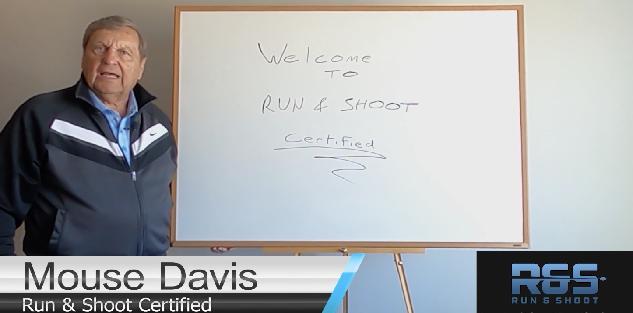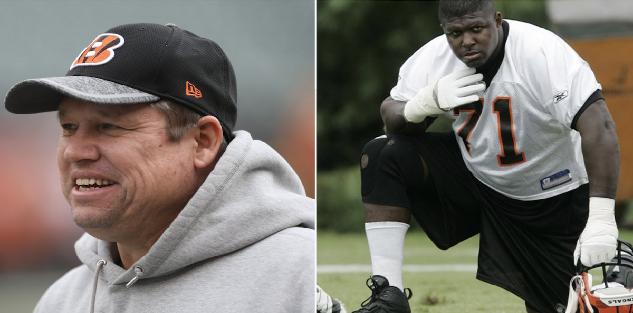Featured courses
- Jim Thorpe Award Winner Jahdae Barron’s 4 Drills for Dominating Receivers by Grant Young
- 5 Tips to Improve Your Football Game Plan by Andrew Dohre
- Game Changer RPO Football : Wing-T Offense by Andrew Dohre
- Mastering the Pass Rush: Expert Drills and Progression Tips from UCLA’s Coach Ikaika Malloe by Andrew Dohre
- 3 SPO’s to Protect the Passing Game and create opportunities in space by Keith Grabowski
- The Art of Running the Corner Route- Coaches and Players Prespectives by CoachTube Staff
- Evolve your Defense with Quarter, Quarter Half to Stop RPO by Coach Grabowski
- Top 10 College Football Players to Watch for in 2022 by Alec Burris
- Clemson vs. Syracuse Matchup of the Week by Keith Grabowski
- Sprint Out Passing: Move the Pocket for Success by Keith Grabowski
- Unlocking the True Potential of Your Special Teams Play by Keith Grabowski
- The Most Important Components of Air Raid by Keith Grabowski
- 4 Plays that Benefit from Bunch Formations by Keith Grabowski
- 3 Third Level RPOs for Explosive Plays by Keith Grabowski
- The Role of the Screen Game in Explosive Offense by Keith Grabowski
- The Chess Match: Win on the Perimeter (Part 1) by Coach Grabowski
- Unlocking the Power of Gap Manipulation to Limit Explosive Plays by Keith Grabowski
- TCU’s 3-3-5 and facing bigger personnel by Keith Grabowski
- Elevating Your Team: Strategies from Coach Matt Ruhle by Keith Grabowski
- 7 RPO’s for your playbook by Coach Keith
- Beyond Quarters - The Need For Additional Coverage Concepts by Keith Grabowski
- 5 Core Offensive Priniciples for a Winning Football Formula by Keith Grabowski
- Win Downfield - Attacking Different Areas Deep with 3rd Level RPO by Coach Grabowski
- WAKE FOREST’S UNIQUE RPO GAME by Keith Grabowski
- Adjustments to Defeat the Tite Front by Keith Grabowski
- Attack Defenses with The Versatile Y-Cross Concept by Keith Grabowski
- Play Action is a Cheat Code! - 5 Play Action Concepts to Increase Your Expected Points by Keith Grabowski
- Question from Rutgers OC - What does your offense say about your coaching? by Keith Grabowski
- Gap Schemes vs. Tight Fronts, Play Action Shots and Misdirection by Coach Grabowski
- Setting up your young Qb for success by Keith Grabowski
- The Hot Gap plus 3 Gap Scheme RPO’s to Stress the Defense by Keith Grabowski
- How Football Coaches Can Build A Game-Changing Special Teams Unit by Grant Young
- Master the Art of Quick Passing for High Completion Percentages by Keith Grabowski
- How to Be an Influential Football Coach by Grant Young
- How to Maximize Tackling Efficiency within Scheme by Keith Grabowski
- Offensive Drills of the Week by Keith Grabowski
- How a Stoplight Can Make Your Fly Sweep Takeoff by Keith Grabowski
- Keep your Drills Fresh and Your Skills Developing - Offense by Keith Grabowski
- Coach Kevin Kelley, Outside The Box by Keith Grabowski
- Want your defense to get off the field after third down? Sims and Creepers are the answer! by Keith Grabowski
- Create More Turnovers with Circuit Training & Win More Games! by Keith Grabowski
- Devastate the Defense with TE RPOs by Keith Grabowski
- Red Zone adjustments by Keith Grabowski
- CoachesClinic.com Featured Matchup: Cincinnati vs Indiana by Caleb Hopkins
- 3 NFL ZONE RUN PLAYS FROM WEEK 7 by Alex Kirby
- Sonny Dykes Teaches You How to Put Together an Offense by Coach Grabowski
- FIVE REASONS TO RUN THE 3-3 DEFENSE by Alex Kirby
- Getting Your Defense Ahead - 1st and 2nd down Pressures from Noah Joseph by John Grayson
- Chad Morris Teaches How To Builds an Offense by Coach Grabowski
- Get Your Offense a +1 With the QB Run Game by Coach Grabowski
- Are You Causing a 14 Point Turnaround...Against Your Team? by Coach Grabowski
- Learn How to Improve Your Offense with USC’s “Harrell Effect” by Coach Grabowski
- The Power of Influence - Rick Jones, Mizzou by Coach Grabowski
- Easy QB Runs to Drive Defenses Crazy by Ryan Eisenberger
- How many different ways can you make the defense cover everyone? by Ryan Eigenberger
- Win Passing Downs with Creepers and Sims by Coach Grabowski
- Always have a plan to play your best 11 by Keith Grabowski
- Dominate the Defense with Double Teams by Coach Grabowski
- Buffalo OC teaches his model for game planning by Keith Grabowski
- Put your 3 Deep Coverage in a Better Position with Zone Alert Rotations by Coach Grabowski
- 5 Keys to Using Trick Plays by Coach Grabowski
- Learn from 'Juggernaut' Offense by Keith Grabowski
- Bob Wylie - Offensive Line Breakdowns by Coach Grabowski
- Utilizing the Hybrid Linebacker to take away Offensive Advantages by Coach Grabowski
- Always have a plan to play your best 11 by Keith Grabowski
- Coachesclinic.com Featured Matchup: #6 Oklahoma vs #21 Texas by Caleb Hopkins
- Easy for You - Difficult for Them Adjustments by Keith Grabowski
- Coachesclinic.com Featured Matchup: Davidson College vs Presbyterian by Caleb Hopkins
- Week 5 National High School Football Rankings by Keith Grabowski
- Protecting Aaron Rodgers (and your own QB) by Caleb Hopkins
- Defensive Drills of the Week by Keith Grabowski
- Woo Pig - Add a wrinkle with these Arkansas Downhill Run Variations by Keith Grabowski
- Coachesclinic.com Featured Matchup: #7 Cincinnati vs #9 Notre Dame by Caleb Hopkins
- Offensive Drills of the Week by Keith Grabowski
- Coach Jason McEndoo Teaches #12 Oklahoma State’s Top Running Play by Keith Grabowski
- Adjustments - Attach Screens to your best plays, defend star receivers, & movement to stop the run by Keith Grabowski
- Coachesclinic.com Featured Matchup: Army vs #16 Wake Forest by Caleb Hopkins
- How To Implement A Running-Back-By-Committee Scheme by Brandon Ogle
- How To Become The Most Feared Offensive Lineman In Your League by Chrisian Benavides
- Wylie, McNally and Alexander Key Coaching Points on the Wide Zone Play by Keith Grabowski
- #21 Coastal Carolina’s play that is a whole offense within itself by Keith Grabowski
- 4 Plays that Benefit from Bunch Formations by Keith Grabowski
- Best Mesh Concept Plays by Ron McKie
- Forming Families For Football by Darryl Page
- Top 5 Things Coaches Should Strive To Get Out Of Spring Camp by Darryl Page
- 10 Tips To Know Before Attending Football Camps by James Breland
- Offensive Line Drills by Rick Bouch
- You’re a captain, now what? 5 Tips to bring your team together and establish yourself as a true leader by Lester Crafton
- COACHING THE 4-2-5 DEFENSE VS SPREAD TEAMS by Alex Kirby
- Gifts From Grinch by Coach Grabowski
- A Package to Help You Win Mid to Late Season by Coach Grabowski
- The Future of American Football: How to Run the Spread Offense by Coach Scott
- Chris Ash teaches Longhorn Tackling by Coach Grabowski
- The misunderstood Yet Powerful Run Scheme - Duo by Coach Keith
- THE GUS MALZAHN QUARTERBACK COUNTER PLAY by Alex Kirby
- FIVE TIPS FROM GUS MALZAHN ON HOW TO BUILD YOUR PLAYBOOK by Alex Kirby
- LITTLEST KID ON THE FIELD TRUCKS LINEMAN – YOU CAN’T MAKE THIS STUFF UP by Jacob
- HOW TO MAXIMIZE YOUR OFFSEASON FOOTBALL TRAINING by Dominic
- BAD CALL, GREAT COACH: THIS IS WHY PLAYERS LOVE PETE CARROLL by Jacob
- How to Get Recruited for Collegiate Sports by Brandon Ogle

5 Tips to Improve Your Football Game Plan
- By Andrew Dohre
One of the most important pieces of advice I ever received came from my high school coach: "Give me players, not plays." This sentiment has stuck with me throughout my career, and I think it resonates with many coaches at every level of football. A great player can make us look like geniuses as coaches, but those players depend on us to have a solid plan in place that sets them up for success.
But what does a truly great game plan look like? The value of an excellent game plan goes far beyond simply calling the right plays at the right time. It’s the difference between crossing your fingers and hoping that the next play works and knowing that you will be successful because you and your staff have put the work in and set your players up for success.
The process of game planning might differ based on the team, level of play, or situation, but there are key principles that apply at all levels. Here are five essential tips that can make a huge difference in your football game planning process.
1. Understand how much Time you HaveHave
One of the biggest challenges of game day prep is the limited amount of time available. Coaches not only have to worry about the time on the clock once the game starts, but have to maximize the time in the week leading up to game day to ensure a good football game plan. This includes balancing practice time to get players familiar with the plays, time for film for players and coaches to be able to recognize and react to situations for game day, and time for recovery so players are physically and ready for game day. Implementing time management to balance all of these situations coaches go through on a weekly basis is crucial in ensuring you get the most out of your practice sessions and that you’re adequately prepared for the game.
As Andy Kotelnicki, the offensive coordinator at Penn State, has pointed out, the key to a successful game plan starts with time management. Whether you have a week or just a few days to prepare, you need to be intentional with the time you have.
Start by assessing your available time and then break down how you’ll break it up into different parts of your preparation process. Focus on the areas that will have the most impact on your performance first, but don't neglect the little things that add up. Time spent on film study, reviewing past games, or even a quick chat with your players can all add value to the preparation process.
Effective time management will allow you to maximize your team’s potential and ensure that you are doing everything necessary to put your players in a good position to win on game day.
2. Divide and Conquerquer
Game planning is a massive task, and trying to do it all yourself can quickly become overwhelming. Whether you have a large coaching staff or you’re flying solo, splitting the work up is an essential part of the process. A strong coaching staff works together to bring different skills and perspectives to the table.
Successful teams at all levels use the divide and conquer method with their staffing responsibilities. Even if your staff is small, dividing responsibilities ensures that each area of the game plan gets the attention it deserves.
Take a page from six-time state champion coach Jason Mohns’ playbook, where he implements this strategy saying how his team at Saguaro High School divides up the work. Each coach takes ownership of a segment of the game plan, whether it’s offense, defense, special teams, or specific positions.
This allows coaches to hone in on their areas of expertise and ensures that no aspect of the game is neglected. It also helps foster collaboration and communication within your staff, which is essential for ensuring that all parts of your game plan align.
3. Evaluate and Adjustjust
What looks great on paper might not always translate to success on the field. And that’s okay—game planning is not a one-time event, it’s a fluid and ever changing process. When implementing your plan, you need to continuously evaluate and adjust it based on how things are working during practice.
Jim Collins, former offensive coordinator at the University of Dayton and current head coach of Wittenberg University, emphasizes the importance of tracking efficiency throughout the week. By grading practices, calculating success rates, and analyzing player performance, you can identify what’s working and what’s not. Are certain plays consistently producing positive results? Are there areas of your game plan that aren’t translating well during practice?
Evaluating throughout the week also allows you to adjust your game plan for unforeseen circumstances. If you have injuries, weather concerns, or an opponent whose tactics differ from what you expected, adjusting the game plan on the fly is crucial for ensuring your team is always prepared for any situation.
4. Make Sure Players are Getting Touchesches
Putting players in a position to succeed is the most important thing for a coach, and it starts by making sure players get the ball enough to make things happen. A game plan is only as good as the players executing it, so one of the best things you can do as a coach is to ensure that your key players get the opportunities they need to make an impact on the field.
Exemplifying this, Mississippi State running backs coach Eric Mele, who works within Mike Leach’s Air Raid offense, explains how the offense is designed to make sure playmakers are getting the touches they need to make a difference.
Mike Leach’s Offense may have a pass-heavy structure, but the goal is always to put the players in a position to succeed—whether that means passing to a wide receiver or handing the ball to a running back. Tracking and planning how much you get your playmakers the ball will make an immediate difference in your program.
A great game plan doesn’t just focus on plays—it focuses on players. Giving them the touches they need to shine is what will set you apart on game day.
5. Set Parametersters
The idea of putting parameters on your game plan might seem restrictive at first, but it can actually be one of the most effective strategies for ensuring a focused and efficient approach. By setting clear boundaries around how much offense (or defense) you’re going to carry into a game, you’re forcing yourself and your coaching staff to make better decisions.
Brian Billick, former NFL head coach, advocates for this kind of structured discipline in his book on game planning. When you limit the number of plays, formations, and schemes you’re using, you avoid overwhelming your team with too much information. Coach Keith Grabowski, host of the Coach and Coordinator Podcast, goes on to talk about this strategy in his course.
To help with this, use technology to simplify the process. Many coaching tools allow you to quickly script and organize your plays, which saves time and minimizes the chance of confusion. With everything laid out, you can quickly see how each part of your game plan fits together.
By focusing on quality over quantity, you’ll be able to deliver a well-rehearsed game plan that your players can execute with confidence and precision.
Overviewview
As football coaches know, a winning game plan is the result of hard work, collaboration, and careful consideration. By using these five tips—understanding your time constraints, dividing the work among your staff, continuously evaluating and adjusting, making sure your players get the touches they need, and setting clear parameters—you’ll be able to craft a game plan that positions your team for success.
Remember, the key to success isn’t just in executing plays—it’s in putting your players in the best possible position to win. With a well-thought-out game plan, you’ll be ready to take on any challenge that comes your way.










